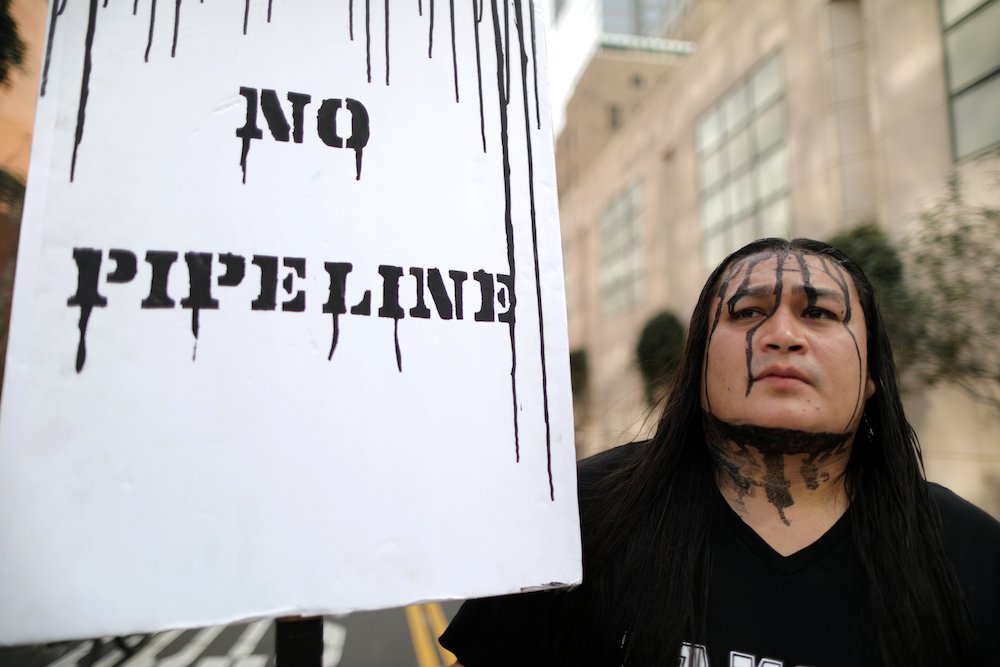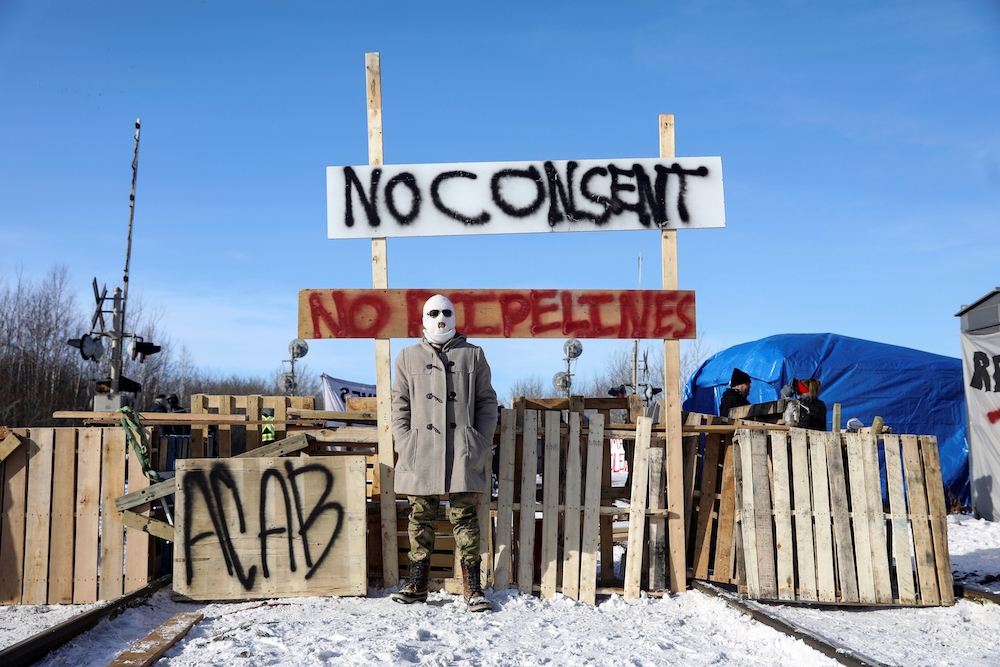
Pipeline projects spark protest not only at rural construction sites, but also among urban activists like this demonstrator in Los Angeles in 2017. (CNS photo/Lucy Nicholson, Reuters)
Editor's Note: EarthBeat Weekly is your weekly newsletter about faith and climate change. Below is the Jan. 15 edition. To receive EarthBeat Weekly in your inbox, sign up here.
Although more and more countries have committed to sharp cuts in carbon emissions in an effort to stem the rise in global temperatures, and even some oil companies admit that fossil fuels are in decline, the construction of oil pipelines continues to spark protests around the world.
Often, those pipelines follow routes that take them across or near Indigenous territories. Just a week ago, on Jan. 9, eight people were arrested when about 300 water protectors and Anishinaabe jingle dress dancers gathered at a pipeline construction site in Minnesota, according to the Indigenous Environmental Network.
The Indigenous demonstrators are protesting the expansion of Enbridge's 1,097-mile Line 3, which pipes oil from Edmonton, Canada, across North Dakota and Minnesota to Superior, Wisconsin.
Ojibwe writer and activist Winona LaDuke is among the protesters. She writes about their reasons for opposing the construction in a commentary originally published in The Nation, which we published today on EarthBeat as part of the Covering Climate Now consortium. Not only will the pipeline carry some of the world's dirtiest crude oil, from Canada's tar sands, she notes, but the worker camps also pose a particular health hazard during the coronavirus pandemic.
In November, Alleen Brown at The Intercept warned that the construction "has the potential to draw together thousands of temporary workers from across the U.S. and trigger a mass protest movement in a state that currently has one of the highest Covid-19 infection rates in the nation."
And in The New York Times, Chippewa novelist and poet Louise Erdrich writes that in the November general election, the "Native vote became a force that helped carry several key areas of the country and our state. On the heels of those victories, the granting of final permits to construct Enbridge's Line 3, which will cross Anishinaabe treaty lands, was a breathtaking betrayal."
Enbridge made more news this week, when it notified Michigan's governor on Jan. 12 that it would defy a state order to stop pumping oil and natural gas liquids through a pipeline that crosses Lake Michigan. In November, the state rescinded an easement and ordered operations to stop by May. The company has taken the case to federal court, arguing that the state overstepped its authority.
This is the latest in a series of pipeline projects championed by the outgoing Trump administration, including the controversial Keystone XL and Dakota Access pipelines, both of which have been targets of protests and court challenges. The issues they raise are not only political and environmental, but also cultural and spiritual.
The Trump administration eased pipeline regulations, but industry executives and environmentalists expect the incoming Biden administration to reinstate environmental controls.

A supporter of the Indigenous Wet'suwet'en Nation's hereditary chiefs stands at a railway blockade during a pipeline protest in Edmonton, Alberta, Canada in February 2020. (CNS photo/Codie McLachlan, Reuters)
Opposition to pipelines, especially those crossing territories of Indigenous peoples and other traditional communities, extends far beyond U.S. borders. In Canada, protests that began in British Colombia, in the territory of the Wet'suwet'en nation, spread across the country a year ago, shutting down rail transport in parts of the country.
And in East Africa, critics warn that a 900-mile pipeline from Lake Albert in Uganda to the Tanzanian coast — another new project ramping up even as analysts predict the decline of fossil fuels — will displace thousands of small farmers and threaten ecologically sensitive areas.
Here in Peru, where I live, I have covered a series of spills from an aging and poorly maintained pipeline operated by the state-run oil company, Petroperu, which carries oil from the country's largest Amazonian oil fields across the Andes Mountains to the Pacific coast.
I've seen how even a small spill can have a devastating impact on Amazonian Indigenous communities that have no safe water supply and depend on rivers and streams for water for drinking, bathing, cooking and washing. Contaminated surface water is a constant health hazard, and oil spills also poison fish, robbing people of a key source of protein and an important part of their livelihood.
Occasionally there are bright spots — Peru's Constitutional Court recently ruled that Petroperu must compensate four communities affected by a spill in 2014. It's a landmark decision that could set an important precedent for other communities that have suffered spills.
But court cases take time, and people get tired of fighting. I'm reminded of a Kichwa woman I met at a three-month-long protest over oil spills in Peru's Marañón River Valley in 2016. A marathon negotiating session with the government had ended at midnight with a 30-point agreement, which the participants were celebrating.
She didn't stay for the party. Over the past couple of decades, she told me, she had seen many such pacts become empty promises. “How many months have we waited for these agreements to be signed?" she asked. "When I see things change, that’s when I’ll celebrate."
Here's what else is new on EarthBeat:
- The coronavirus pandemic is a sign of ecosystems out of balance, writes Jon Magnuson, but when we lose sight of the ways in which the threads of nature are intertwined, gray wolves, St. Francis of Assisi and Indigenous ways of understanding the world can bring us back to earth.
- The planet is approaching critical climate tipping points, but there are also signs that society is tipping toward stronger action on global warming, says climate scientist Tim Lenton, director of the Global Systems Institute at Britain's University of Exeter. Lenton spoke with Rhett Butler of Mongabay, a member of the Covering Climate Now consortium.
Advertisement
Here some of what's new in other climate news:
- A new $10 million campaign features climate scientists who are also mothers appealing directly to other mothers to support action on climate change, reports Anna M. Phillips for the Los Angeles Times.
- Brian Kahn and Dhruv Mehrotra at Gizmodo's Earther follow the money trail leading from fossil fuel companies to Republican senators who publicly supported the conspiracy theories that led to the storming of the U.S. Capitol on Jan. 6. And at The Washington Post, Dino Grandoni and Alexandra Ellerbeck look at how climate change advocacy groups plan to stage protests and lobby legislators in the wake of the Capitol riot.
- NASA says 2020 tied with 2016 as the hottest year on record, while the National Oceanic and Atmospheric Administration puts it at just 0.04 degree Fahrenheit cooler than 2016, reports Andrea Thompson at Scientific American.
- In a landmark case, former Michigan Gov. Rick Snyder was charged with willful neglect of duty for decisions in 2014 that led to Flint's lead-contaminated drinking water and a Legionnaires' disease outbreak. David Eggert and Ed White have the story for Associated Press.
Upcoming events:
A virtual workshop sponsored by Creation Justice Ministries on Jan. 21 from 6 p.m. to 7 p.m. Eastern Time will focus on "Policy Solutions for Climate Resilience: Opportunities in the Biden Administration and 117th Congress." You can find more information about this and other upcoming events on the EarthBeat Events page.
Closing beat:
If you're looking for a good discussion starter to help your parish or faith group explore why countries must increase their commitments to cut greenhouse gas emissions, take a look at this short video from from CIDSE, a coalition of Catholic development agencies.
It brings together key messages from a December webinar on "Faith, science and youth," organized by the Vatican's Dicastery for Promoting Integral Human Development. During the event, the dicastery's prefect, Cardinal Peter Turkson, warned that the world "is not doing well" on climate change, as EarthBeat's Brian Roewe reported.
What other resources have you found useful for discussing climate change with your creation care committee or other faith group? Let us know at earthbeat@ncronline.org, and we'll share them here.
If you like EarthBeat Weekly, please spread the word! Feel free to pass along the link to EarthBeat Weekly on our website. Or if you prefer, you can sign up here to receive the newsletter in your inbox every Friday. Thank you for reading EarthBeat!






